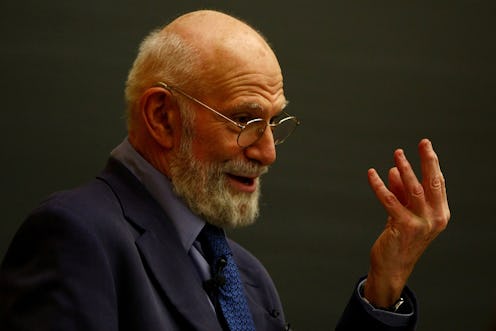News
Read These Works In Honor Of Oliver Sacks
The world was shocked and saddened to learn that renowned neurologist and author Oliver Sacks died of cancer at 82, just months after revealing his terminal diagnosis to the world. Oliver Sacks pieces are popular, both in his field and with readers who have no background in neurology. The author of more than a dozen books, Sacks was known for his fascination with the human brain, which came across in his clear yet eloquent descriptions of the case studies on which his books were based. In fact, he would often call his books "neurological novels" due to their focus on the humanity of his patients. "I love to discover potential in people who aren’t thought to have any," he told People magazine in 1986.
In a review of his most recent memoir for The Guardian, author Lisa Appignanesi wrote that the subjects of his books are "transformed by his interest, sympathetic gaze and ability to convey optimism in tragedy into grand characters who can transcend their conditions." In fact, Sacks himself suffered from prosopagnosia, aka face blindness, which he wrote about in the New Yorker essay "Face-Blind."
His passing robs the world of further published writings, but his body of work produced plenty of material for us to enjoy. Let's take a look at some of the best works to remember him by.
1. The Man Who Mistook His Wife for a Hat
Although it was his fourth book, this collection of neurological case studies became Sacks' first best seller upon its publication in 1985.
2. Awakenings
Perhaps his best-known book, Awakenings describes the case histories of patients who were "awakened" by Sacks decades after contracting sleeping sickness during World War I. Their stories were later adapted into both a Harold Pinter play, "A Kind of Alaska," and a 1990 movie starring Robert De Niro and Robin Williams.
3. "The Joy of Old Age"
Sacks' reflection on the happiness to be found in aging, written shortly before his 80th birthday, takes on a new meaning in light of his death.
"I do not think of old age as an ever grimmer time that one must somehow endure and make the best of, but as a time of leisure and freedom, freed from the factitious urgencies of earlier days, free to explore whatever I wish, and to bind the thoughts and feelings of a lifetime together," he wrote.
4. On the Move
Sacks may be famous for his career as a neurologist and author, but he lived an astonishingly fast life. This memoir, which was published closely following the announcement that he had terminal cancer, chronicles his drug addiction, family relationships, and, of course, his unending love affair with the complexities of the human brain.
5. "My Periodic Table"
Written after his diagnosis, "My Periodic Table" is an essay that draws parallels between the years of Sacks' life and various elements on the periodic table.
"A few weeks ago, in the country, far from the lights of the city, I saw the entire sky 'powdered with stars' (in Milton’s words) ... It was this celestial splendor that suddenly made me realize how little time, how little life, I had left," he wrote. "My sense of the heavens' beauty, of eternity, was inseparably mixed for me with a sense of transience — and death."
6. "My Own Life"
In February 2015, the world was shocked and saddened to read of Sacks' diagnosis with terminal liver cancer in this op-ed for The New York Times. The short piece is a resigned yet ultimately hopeful meditation on the detachment that accompanies knowledge of your imminent demise, and it's definitely worth a read.
"I have had an intercourse with the world, the special intercourse of writers and readers," he wrote. "Above all, I have been a sentient being, a thinking animal, on this beautiful planet, and that in itself has been an enormous privilege and adventure."
Image: Wikimedia Commons (1)
